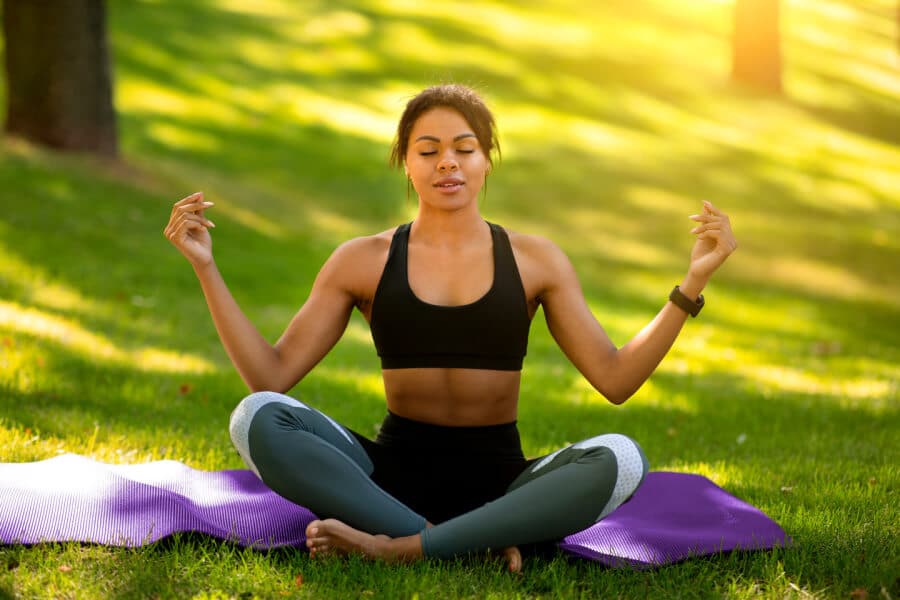This is my second non period specific blog post, but I have had a lot of people ask me about my yoga teacher training both online and in person as they are trying to make a decision for themselves as to whether to pursue a training and in what format.
My Yoga Journey For Some Context
A quick summary of my yoga journey, I tried yoga on and off for years and really struggled in the early 2000s as all the classes around me were flow classes and I have low blood pressure so would black out a lot. On top of that, being deaf, I can’t hear cues and despite yoga being about focussing inwards, I would have to look around to copy as I didn’t hear commands.
I finally found a great teacher who was clear and did very slow flows, only 5 doors down from my house, and it was life changing and brilliant. And then she met her beloved and moved continents to be with him. I was so happy for her, but felt a bit sad that this beautiful soul was no longer around and my yoga practice plummeted.
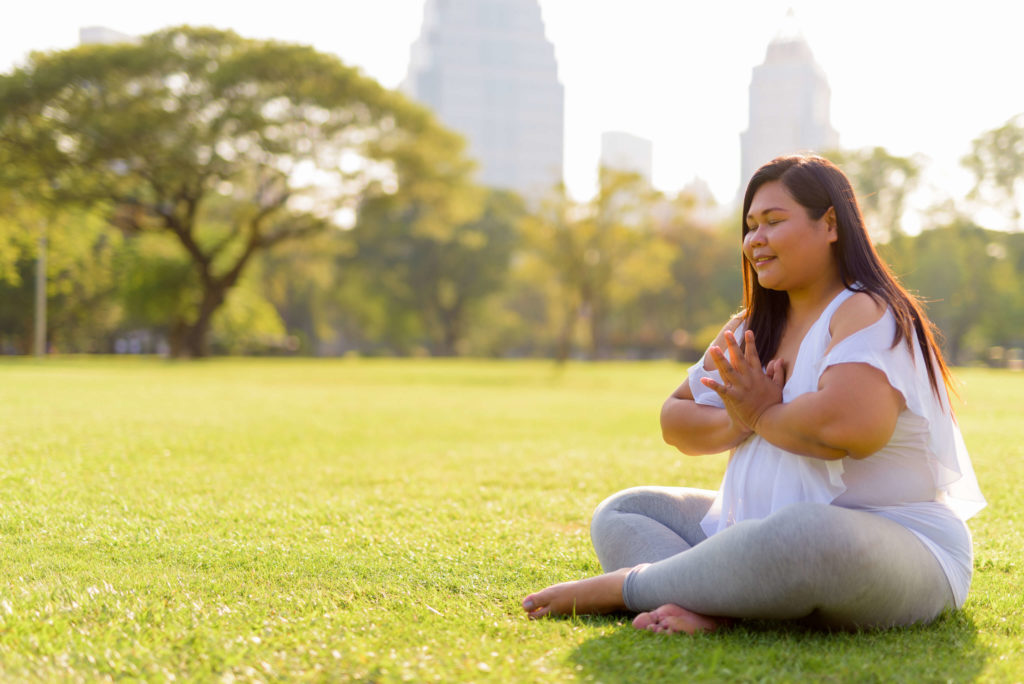
I found a few hatha, yin and restorative practices online on Youtube, but it is a bit weird as I never know if I am doing something right as I had no feedback. Fast forward to a foundation teacher course being available locally to me in the UK and I thought this would be great. Many people do the teacher training, not to teach, but to enable them to understand how to put together a sequence, in a way that works bio-mechanically and what are the safe ways of doing a pose or movement and what signs to look out for that you are not doing it in a way that is safe for your body. Also how to modify and more on the other limbs of yoga, something that gets neglected in a lot of asana based classes (moving through postures only).
One thing I love about the many limbs are that you can really delve into your thoughts on what it means to follow the yamas and niyamas and build a strong ethical code, which is something a lot of people struggle with. I also love pranayama or breath work, which can be super healing, and a great life “hack” (it really should be integrated as part of your life rather than used as a hack), and is accessible to almost anyone.

My Yoga Teacher Training (YTT) Experience
I wasn’t looking to become a yoga teacher, but I really wanted to deepen my knowledge so I could practice somewhat self sufficiently in the styles that I could do with my own personal medical constraints because many yoga classes do not allow you in with low blood pressure (due to blacking out especially during Sun Salutations). I was really looking forward to it and whilst I understand that this format is perfect and a beautiful fit for some people, it was extremely difficult for me personally.
To give a few examples, of why it was not the right fit for me:
- Inconsistent information about length, fees and told last minute it had to be residential, but late joiners were ok with not being residential.
- Despite asking about whether the instructor could make sure I know they are talking and face me, and/or speak clearly and loudly (I have over the ear hearing aids that fall off in some poses), this was not met most of the time. There’s only so many times you can ask for a repeat before you seriously disturb anyone else’s flow.
- Always being “on” as with shared rooms, meals and no down time to reflect except meditations. I am an introvert and need some time alone with my thoughts to recharge.
- Inconsistent schedules, we missed a tonne of the core content required to pass and had to pay further costs for 1-2-1 time afterwards to catch up if we wanted to qualify, which was made worse by surprise guest experts who were great and a wonderful addition, but it put us more behind.
- Very little feedback on my sequencing or teaching, we were put in to pairs and the trainer wondered around watching us teach for a few moments.
- Exams were just the teacher asking us a few questions quiz style going around the group. No written anatomy or understanding of the background or theory.
The above style is perfect for some people, just not me, however, I did not feel that confident at the end fo the week and my personal goals were not met. It is also important to note, that other in person programmes run very differently and out of the thousands out there, one is experience is not reflective of the whole. However, it did teach me a lesson in doing my research before enrolling on a further course.
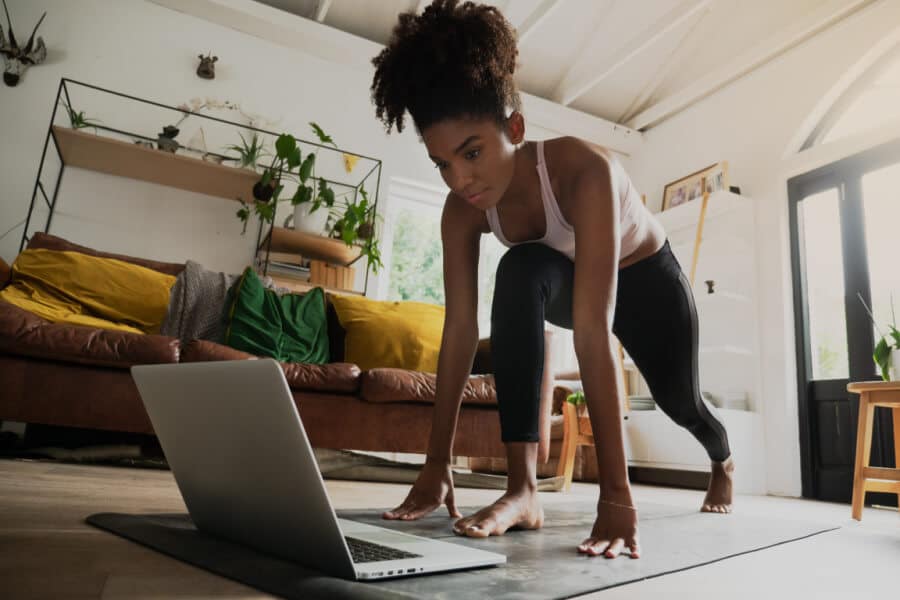
When Covid happened, I spotted a few online YTTs and they were discounted as part of the giving back philosophy, so I thought “why not, I might even get something out of it that I can integrate with my client facing work”. The difference for me was night and day.
I started off with one school for the 200HR YTT and it taught us the basics of how to assess posture and safety in poses, a lot about the background of yoga, the philosophies, the different limbs and ayurveda. There was a lot on disability adaption. I could work at my own pace, there was online support in part of the Facebook community and we could submit questions for weekly calls. I made my way through that and ended up with my RYT200HR and got so excited, I started teaching community classes to other people locked down over Zoom through my usual charity volunteering.
The school I did my 200HR with at the time did not offer a 300 HR YTT so I went to another school, My Vinyasa Practice (MVP) and did theirs and it was amazing. I had a mentor (they are now called peer support), as part of the curriculum who I could ask for assistance with and get extensive, detailed direct feedback on my teaching, a Facebook community, students who were super engaged and creating accountability and study groups, and the content was fantastic. It went deeper into sequencing, practical anatomy, that involved getting on the mat and testing things, not just dry reading about it.

Every module had an a set pattern, theory, practice reflection. It was set out beautifully clearly for my dyslexia, the welcome packet was super clear on what to do and I felt that my hand was held all the way through. There was a huge catalogue of extra content as well as live content office hours which were master classes on particular topics as well as access to the online studio classes. I was so happy to complete it and I am now an RYT 500 with specialties in restorative, yin and gravity/flexibility yoga, pranayama and nidra, it lit my inner fire and passion for yoga again.
I have also done some great post graduate programmes such as pelvic floor, lower back and hips focussed yoga, Gravity (flexibility) yoga, Yin yoga, Restorative yoga and Nidra. I am also currently doing a pre and post natal certification.
I get a lot of stick for doing an online YTT, however, I had to sit theory tests and complete them by myself rather than just answer questions which in my opinion is more thorough than just being asked as part of a group. I had over 20 hours of direct supervision and feedback for my voluntary teaching hours (part of the 300 HR requirement to give back as well as practice).
So, how do you know what format is right for you? Here are a few things to consider.
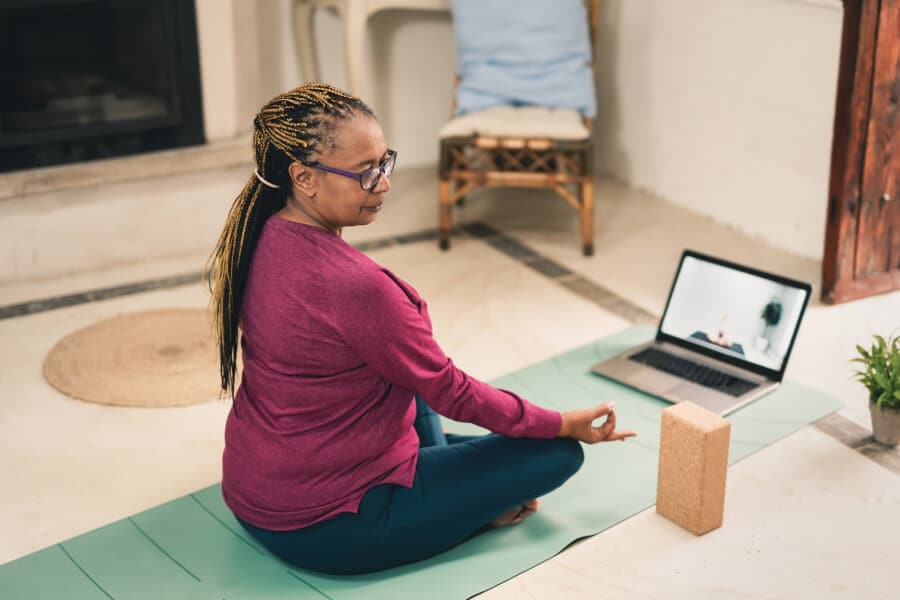
How Do You Recharge eg Introvert vs Extrovert?
Extroverts recharge their energy in a social setting and introverts recharge their energy in a solo setting. Most people need some time in the day both with others and by themselves. If you are looking at an in person course, take a look at the setting.
Is it somewhere fully immersive in communal living in a remote location? If so are there silent or break times and do they get taken? Is it residential and if so, can you leave to take time alone or go home? Do you thrive being immersed and love the idea of going off the grid for a few weeks? Are there any hidden extras if you don’t cover everything or for accommodation, food or any other supplies?
With an online course, how interactive is it? Do you need the interaction? Are there group coaching calls, office hours, or mentoring available? Are the other students engaged and up for forming accountability and study groups? Are there any hidden costs eg do you have to pay to sit assessments or for tutor support? how responsive are they to queries and e-mails?
And finally are you more introverted or extroverted? Where do you feel most energised to learn or does it really matter to you?
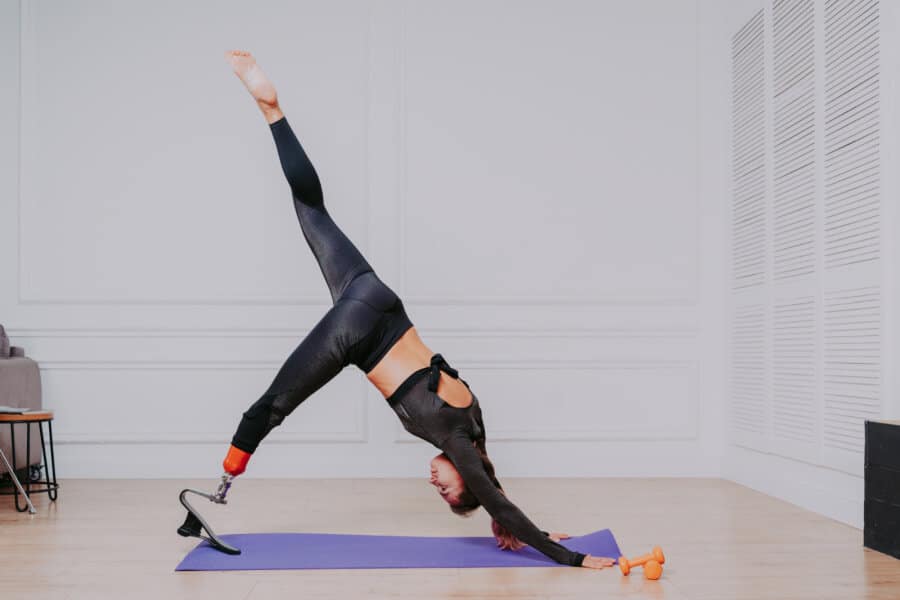
Accessibility & Special Needs
If you are attending an in person training, is it suited to your needs? If you have physical limitations, are you able to get to the location safely and what are their fire and emergency procedures? If residential do they have accessible rooms and bathrooms?
If you have learning needs such as hearing loss (in my case), dyslexia or partial sight, is there an accommodation for those needs whether online or in person? Are you allowed to record or have a note taker if live?
BTW, if you are watching anything online with speech, if you use Google Chrome and have a Google account, you can turn on closed captions using these instructions. It’s been an amazing resource for me.
If online, or in person, is there any recording going on and can you access those afterwards? Is there a transcript or notes provided afterwards?
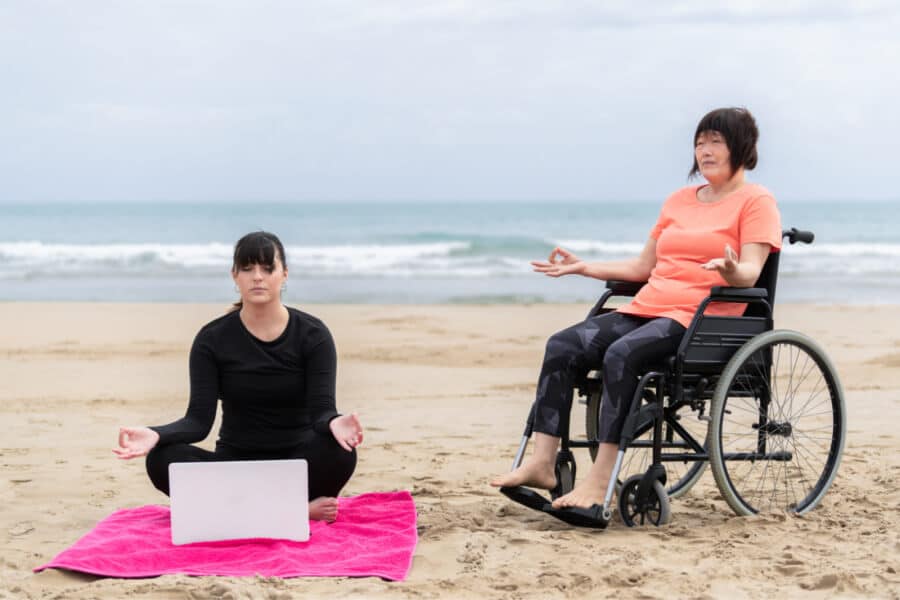
Your Learning Style
Do you have a clear learning style that works for you? Most people divide learning into the following categories; auditory (listening), verbal (speaking), visual and kinaesthetic (movement based). Have a think about when you have had to learn. Did you excel in classroom style teaching at school, movement style learning such as in a yoga class, or watching yoga videos or other videos online? Or do you like to be given a problem to solve and work through on your own? What has worked for you in the past?
I think most of us use them in different portions, I know I love a good visual diagram, but I’m dyslexic so I like a clearly read transcript. I also like to work through things on my own to get it to click. So if someone is talking about the primary and secondary movement or action or an asana/pose I like to follow along trying it within my own body.
Regardless of whether the course you are interested in is in person or online, both could have a mix of learning styles. In person could be lecture style and online could be a follow along. Reach out to the school and find out how they work or whether it is a blend and think whether that blend is right for you?
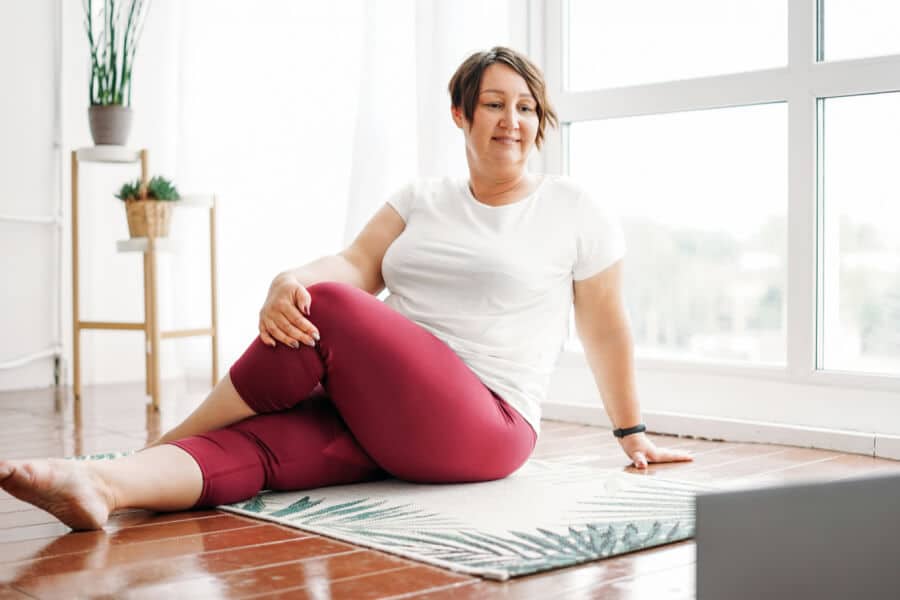
What Is Your Study Discipline & Planning Like?
There is zero shame in admitting that you find studying alone, online or on your own difficult. There are ways you can overcome this and you can learn to plan your studying effectively, which if paired with an accountability partner in the same situation, can make self study achievable for more people.
But there are some people who either can’t focus when self studying or have dependents or other commitments that make it pretty much impossible to study at home and an immersive experience in person is the best and ideal solution for them.
You need to have an honest communication with yourself about how easy or difficult you find it to concentrate. Please don’t judge yourself or think there is something wrong with you if you find self study discipline difficult, it is way more common than people think.
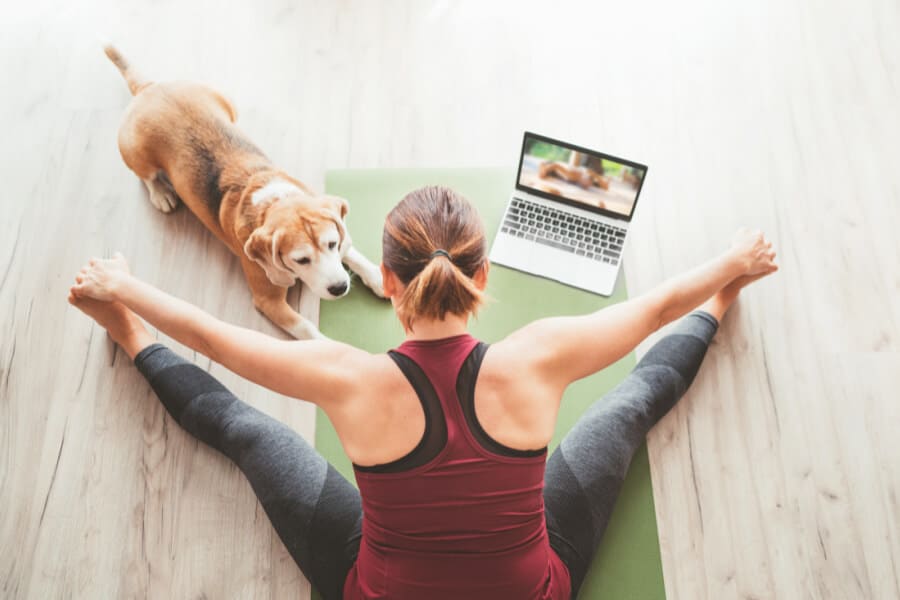
Code of Conduct Whilst Studying
What is the code of conduct for the course you are on? Some schools will have a very set interpretation of the Yamas and Niyamas and expect full compliance whilst you are learning. Others will ask you to explore what they mean to you and coach you in how you can integrate them into your own life.
It is worth finding out what the requirements are before you enrol as there are usually very good reasons as to why the school has those requirements in place and it is key to your experience and growth. So failing to adhere to them could affect your experience and rob you of the opportunity to experience what was planned in full. Non compliance could also result in you losing your place on the course with no refund or failing at the end.
Examples of some requests I have seen include:
- Dietary (usually plant based, vegan or vegetarian, but do ask, especially if you have allergies or restrictions yourself).
- Celibacy.
- Silence at certain times.
- Certain sleep and wake times.
- Service which could take place in many ways from cleaning and cooking to the group, volunteering in a shelter, teaching a certain number of hours to groups who can’t afford yoga classes.
- Not reading or watching or taking part in any other yoga classes or materials, whilst taking the course.
- No access to other forms of media or the outside world.
There are other requirements and restrictions that may be in place for participants, but make sure you read the code of conduct thoroughly and ask questions before enrolling. It is important that you take some time to seriously consider the commitment you are making and some courses may have requirements that are not achievable for you or your lifestyle or life circumstances.

Community
One thing that is difficult to replicate online is the sense of community that can develop on an in person course. I have done immersive in person courses such as the Fertility Massage Therapy course that was beautiful and life changing. I have made life long friends and truly came out with all the cliche feelings of being part of the sisterhood. We have remained in touch and reach out to each other on a periodic basis.
You can also make friends and get a sense of community connection online with people across the world. Online relationships can be beneficial too, and can be used to follow up from an in person course or for the duration of an online course and afterwards.
However, you need to think about what community involvement you need. In person, online or a blend of the two?
How do you want to contribute to a community and what do you want to take part in? Organising or participating in bookclub style groups that go through the course content and have discussions afterwards to help integrate that learning. Or maybe you want an accountability buddy?
Or do want open discussions, philosophical debates, feedback on your asanas, sequences or photos of your personal practice? It doesn’t matter what purpose you want a community for, but make sure you are contributing as well as taking from any community you join.
Again, ask the course provider and past participants for feedback on what communities exist around the course you are interested in.
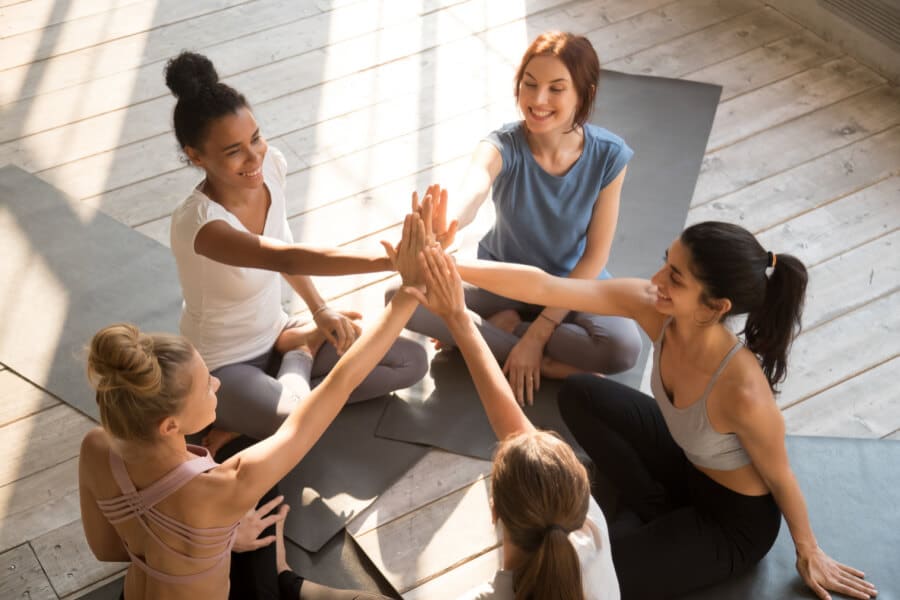
Instructor Support, Feedback, Mentoring & Peer Support
Whilst it is important to work out how important this is to you, I would argue that it is important to get regular feedback on both how you demonstrate, how you adjust people, your tone and clarity, and your teaching style in order to be safe.
The same is true for sequencing, and being able to keep your students and yourself safe. However, how you get that feedback and how much you get can vary from course to course. Are you taught how to evaluate yourself and how? Are you taught what to feel for in your body and how to critique photos and videos of yourself?
Or are you given critique in person and if so, is it dedicated quality time, or someone just keeping an eye on every one and wondering around the room?
If you have questions on the course material, how can you get support or clarity? Is there an online form or e-mail, do you put your hand up, are their coaching calls, how far past the end of the course do you have support? Is there a dedicated support team?
You may want to check out what each course provides and see if it is something that would work for you.
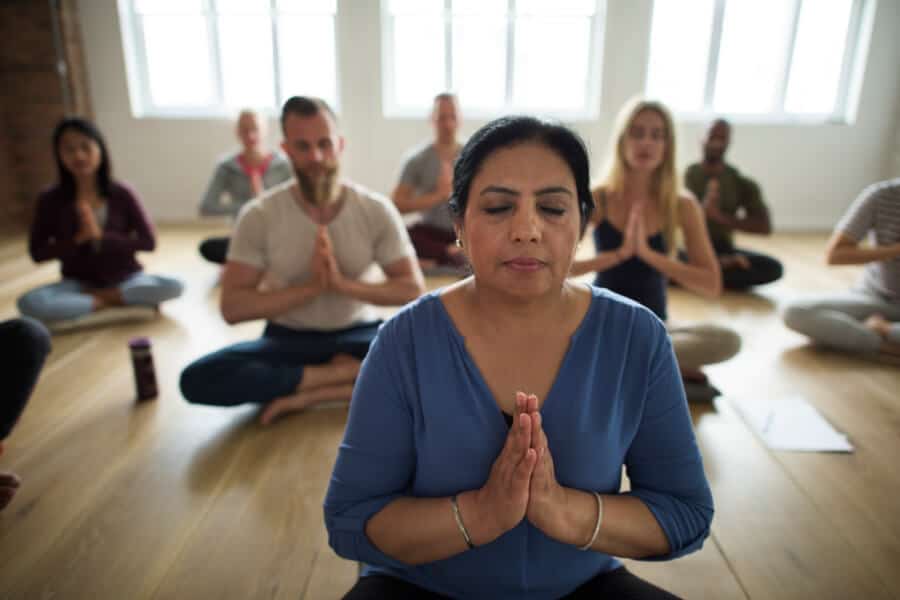
Do You Want Access To The Material Post The Main Course?
Both online and in person courses provide materials. Finding out whether it is digital, physical and how long you will have access to it and is it enough for you to be able to refresh yourself on the material when needed (this is super important to keep your skills at their best).
Again, find out what is available in the course you are interested in, and make a decision on whether that is adequate for you.
If There Is A Live Component To The Course, Is There A Replay Or Do You Need To Pay An Admin Fee To Resit?
Honestly, this sounds unfair to some people but you do need to check the terms and conditions of the course before you book onto one to ensure that you understand the requirements and whether you need to pay for rebooking.
For in person courses and courses where the numbers are restricted, they are costed to allow for a certain number of people and those overheads have to be paid, even if it is an online platform and the training provider has to pay regardless of whether you turn up or not. Rebooking people onto other dates often requires a fair bit of system hassle and whilst one person rebooking may not create that much extra work, a bunch of people can create hours of work for the course provider.
Also, it can wear you down mentally to provide a service and a huge chunk of people have not turned up after committing, assuming that they won’t be missed (which is becoming super common these days). Part of becoming a teacher or running your own business is following through on commitments and turning up, and if you aren’t able to do this for your teacher training, you do need to have a think about whether this is the right path for you.
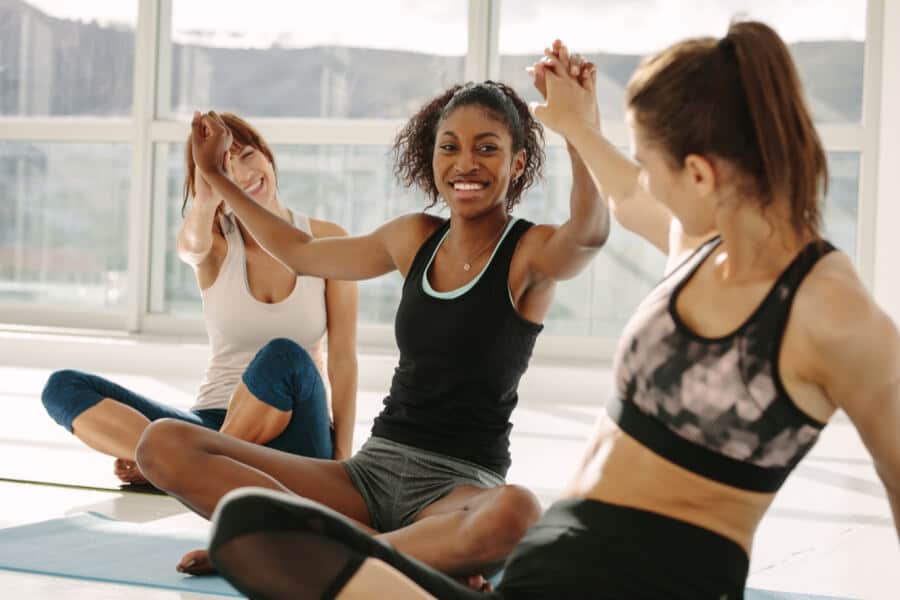
Finally, many courses including online have prepared the material and learning with specific numbers and groups of people in mind. Whether doing break out activities in person or in break out rooms, if there is a change in numbers because a lot of people have decided they just don’t have the energy to attend, this can cause issues and lessen the experience for all participants.
I say this as a person with chronic health conditions that can flare up as fatigue, I try and follow through with commitments that affect other people or avoid signing up to anything that is time sensitive if I am going through a fatigue stage.
Equally, if the course is open participation and anyone can jump on at any time and the replay is available, then this isn’t an issue but do research your courses terms and conditions and please don’t be that person who didn’t read the Ts & Cs and then bash the provider online.
Check Out The Requirements To Pass
This is a super key point. You may have to provide photos, sequence notes, sit exams, tests or quizzes, provide videos or your practice or or you teaching, or give classes. Find out what is required and are you able to do this if you are self studying at home?
Yes some consideration might be given if you are doing your best and occasionally a cat walks by in the background. But if you are submitting a class video and having to constantly run around to deal with phones, food on the stove and caring for dependents who need your attention, this is not beneficial for you and you might not pass. A dedicated in person course may be a better option in this case.
Equally, if you have to do an exam, with a camera on and you are not allowed to move away from the camera or have any kind of background noise, then you need to be able to provide that environment. If that isn’t possible, then again an in person course.
It’s also worth checking out language requirements. I have done courses where it was super clear that the course is in English, the coursework was required in English, and the participants have gotten very upset that they can’t hand the assignments and videos of them teaching in their own language.
Make sure that you enrol in a course in a language you are proficient in, as very few course providers are going to have someone who can speak every language or pay for translation services to mark your work. Especially as they are small businesses who are often just making a living and don’t have the money to pay for interpreters.

What Style Yoga Do You Want To Do Or Want To Teach?
This should hopefully be easier for you to solve as you will have been doing yoga for a while. Most of the YTTs are focussed on a particular style, eg Hatha, Vinyasa or Ashtanga. However, there are shorter YTTs that focus on more niche styles such as trapeze, yin or gravity styles.
Some of these shorter courses are accredited on their own and some require that you have done a full teacher training and this is just an add on, in order for you to be covered to teach it.
Hopefully by the time you are considering a YTT, you have a clear idea on style, however, if you truly are ambivalent, hatha seems to suit a broader group of people. There are also some online YTTs that offer the flexibility of you can qualify in any style.
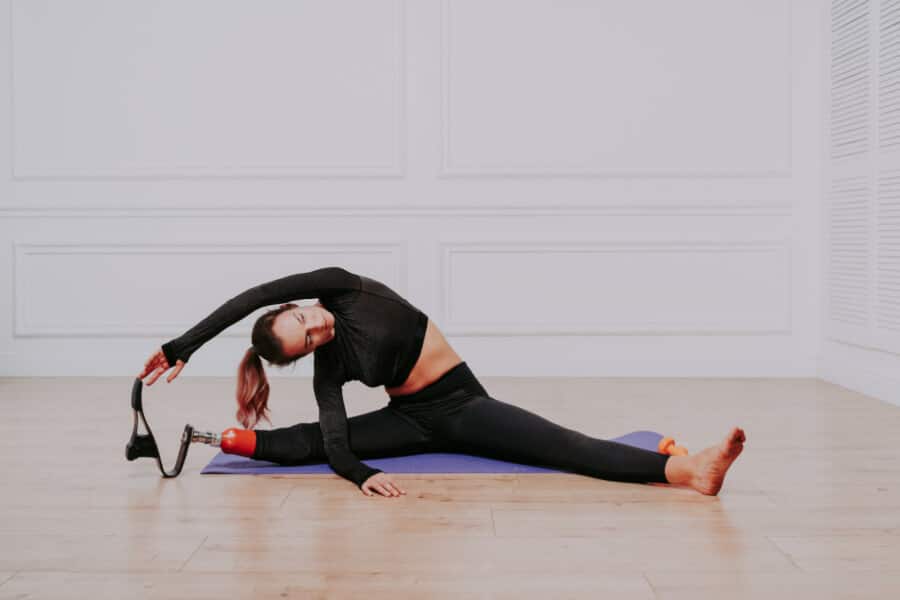
Are You Looking For A Prescriptive Course Or A Framework?
This is always an interesting one for me. There are some YTTs that are very much a prescriptive style and tell you how to teach from step 1 right through to the end point with a strong method and list to follow throughout. For some people this is really helpful.
Others will give you the tools you need to decide which approach to use and you can use the overall framework and pick the approach that works for you.
Again, neither of these styles are better than the other, the important thing at the end is that you are able to guide your own practice and that of others safely.
Accreditation & Insurance
There is so much debate online whether courses should be accredited with professional bodies such as with Yoga Alliance of the British Wheel of Yoga. You will get some studios and insurance companies that require the course you take to be accredited with one of these professional bodies and you will get courses that the course provider gets approved by an insurance company such as BeYogi, so you can get cover without having to go through a professional body.
A brief summary of the arguments for both sides of the accreditation puzzle are as follows:
Against accreditation and professional bodies: it is extra money you are paying just to say you are a member, you can get insurance without accreditation, some professional bodies don’t do anything for their members, you can apply for teacher discounts in some places anyway. Who is to say what is an acceptable standard and it is a westernised attempt to capitalise on an ancient practice. Accreditation doesn’t mean the course is better than a non accredited course.
The accreditation process is also very long winded and paperwork heavy and sometimes expensive for the instructor and they may want to focus their resources on creating a great quality programme and experience.
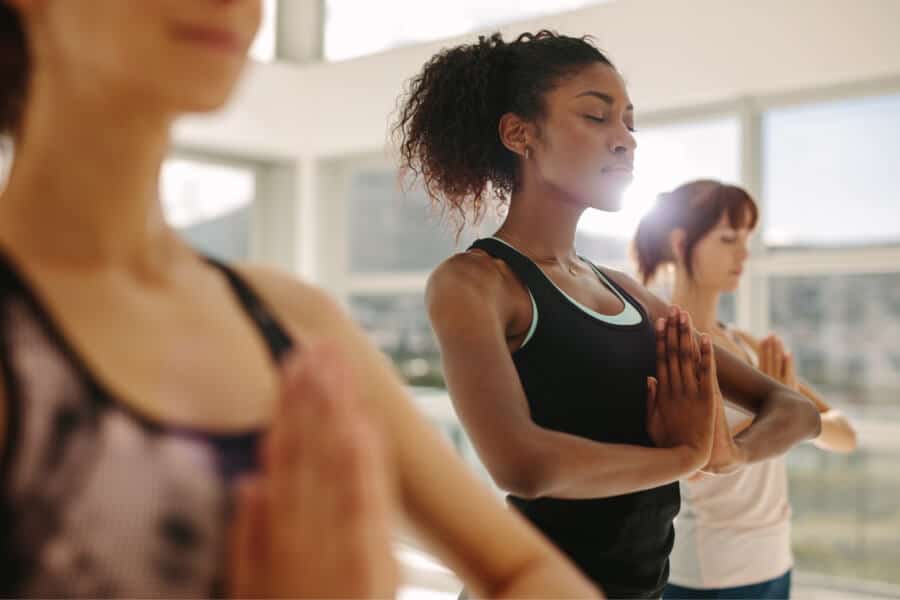
For accreditation and professional bodies: there are teachers out there who are dangerous to themselves and their students as they are self taught, have done very poor quality YTTs and can cause injury. Having an accreditation standard means that there are some minimum standards that must be attained for someone to be on the register. Ensuring that there is continuous professional development is important for the teacher to keep their quality high.
Some professional bodies also have a strong code of ethics such as no relationships with students (which when you consider some of the scandals in the yoga world recently, you can see why this is important), diversity and inclusion policies and training, free continuing professional education videos, access to resources, discounted insurance and other yoga products.
There are some very good quality courses out there that are not accredited, so even if a course isn’t accredited to a professional body, all you need to do is to check with an insurance company that it will cover you for the formats you want to teach eg in a studio, online or 1-2-1.
Full disclosure I am registered with Yoga Alliance and enjoy the membership benefits, but I have done some fantastic courses that are not accredited with them too.
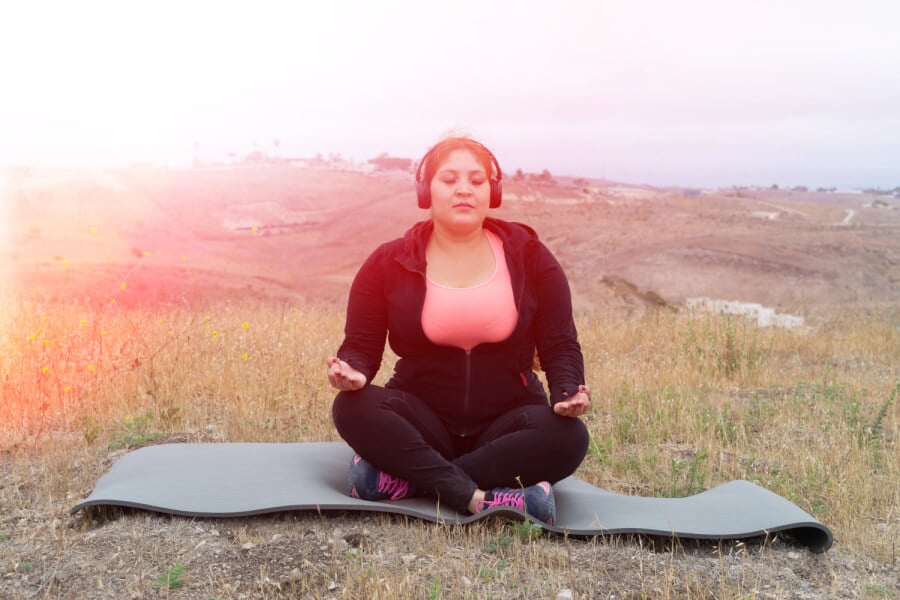
Some Tips On How To Choose
Going through the above mentioned list of requirements, should help you to find what you are looking for to some degree. It is important to make sure that you know what your non negotiable must haves are, and what your flexible wants are as it is unlikely you are going to find the exact perfect fit (although, I hope you do).
Once you’ve narrowed it down to a short list of ones that fit the bill, you can look at other factors such as finance or live time required to see if those are limiting factors for you. But there are some other things you can do to help you decide:
- Read through their published media such as website and any brochures very thoroughly and see if it vibes.
- Do they have a blog, a podcast or are they interviewed by other organisations? If so, get a feel for who they are and their approach.
- As on forums and social media if anyone has done that training and ask for feedback and thoughts. Just bear in mind that as with my first experience, they may be biased in their feedback depending on whether it met their requirements and personal goals, not whether the teacher training was good quality.
- Do they have reviews and if so what do they say?
- Take some time pondering each course and listen to what your gut has to say.
- How proactive/reactive are they in responding to messages with queries?
Do I Have Any Recommendations?
I loved My Vinyasa Practice (sometimes called MVP) as it was accessible, had great content, feedback and support and highly recommend it both for YTT general training and their other courses.
I also highly recommend the Moga pre and post natal training for existing YTTs.

